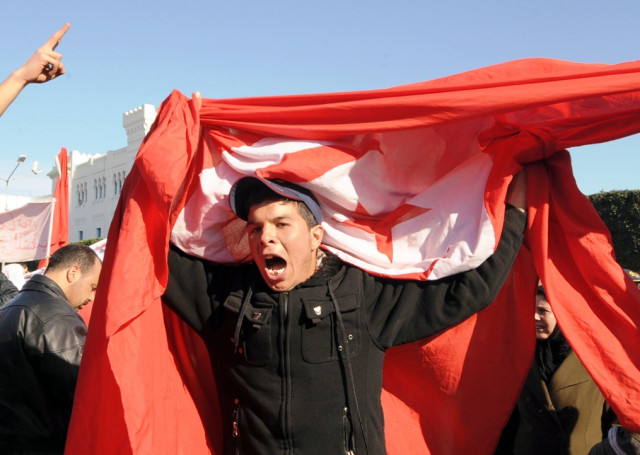Conservatists urge bigger role for Islam in Tunisia
Want to create new Tunisia different sectors would be reformed according to Islamic principles.

Draping their banner from the town's ancient mosque, supporters of Ansar alSharia, or the Partisans of Islamic Law, one of the Islamic movements in Tunisia, turned out in a show of force likely to cause alarm among secularists.
In jail or underground before the 2011 uprising that ousted secular strongman Zine alAbidine Ben Ali and launched the Arab Spring, Tunisian conservatists have since become more assertive.
On Sunday, Salafis from around Tunisia descended on Kairouan, many wearing long beards, robes and caps.
Several speakers at Ansar alSharia's second national conference had been imprisoned on terrorism charges either in Tunisia or in the US detention camp at Guantanamo Bay.
Speaking to cries of "Allahu akbar", de facto leader Saifallah Ben Hussein, better known as Abu Ayadh, presented the movement's vision for a new Tunisia in which the media, education, tourism and commercial sectors would be reformed according to Islamic principles.
"In tourism and commerce, we say to those who suffer that the solution is to end usury," he told supporters, referring to the payment and receipt of interest, which is forbidden in Islam.
Abu Ayadh called for the creation of an Islamic trade union to confront the powerful and secular-dominated unions that have clashed repeatedly with the government, but said the movement would rely on dialogue not force.
"To those in charge of tourism in this country, we say that for over a year there has been no attack on a single hotel or a single tourist," he said. "We restrain ourselves. We say this is to be done through preaching."
No clash with Ennahda
While conservatists did not play a major role in the revolution, the struggle over the role of religion in government and society has since emerged as the most divisive issue in Tunisian politics.
Salafis want a broader role for sharia in the new Tunisia, alarming secular elites who fear they will seek to impose their views and ultimately undermine Tunisia's nascent democracy.
While the moderate Ennahda won October elections and now leads the government, it has chosen to rule in coalition with two secular parties and has said it would not seek to impose sharia, to the dismay of the more conservative Salafis.
Sunday's conference had been billed by some secularist newspapers as the moment when Tunisia's Salafis, some of whom have al Qaeda sympathies, would break with Ennahda.
But Abu Ayadh said the Salafis would not clash with others despite differences in outlook.
"They (secularists) want there to be a break between us and other Muslim currents but, no matter how much we differ with other Muslims in this land, our religion prevents this," he said.
Tunisians are mostly Muslim but their country's long secular tradition has been tarnished by association with Ben Ali and his predecessor Habib Bourguiba, both dictators.
Conservatists were severely repressed under Ben Ali, when men who grew beards or went to the mosque were closely watched. Women were discouraged from hiding their hair let alone their face.
They now say they are practicing their right to express their vision and beliefs as any other Tunisians do.
"We have been waiting for this moment, this freedom for so long. Under Ben Ali, I used to wear an ordinary headscarf but I did not feel free," said one woman, dressed from head to toe in a black veil that revealed only her eyes.
"After the revolution, I felt free to become more religious and the more I get into my religion the more I feel at peace."
Both Salafi men and women at the rally said they did not seek to ban alcohol or impose the veil but would seek to spread Islamic values through preaching and dialogue.
Secular critics fear a gradual encroachment of ever stricter rules, however. They want Ennahda to rein in religious zealots.
"Is it true there are thousands?" asked one shopkeeper, an unveiled young woman, near the mosque in Kairouan. "It is the first time I have seen so many. It is scary."



















COMMENTS
Comments are moderated and generally will be posted if they are on-topic and not abusive.
For more information, please see our Comments FAQ